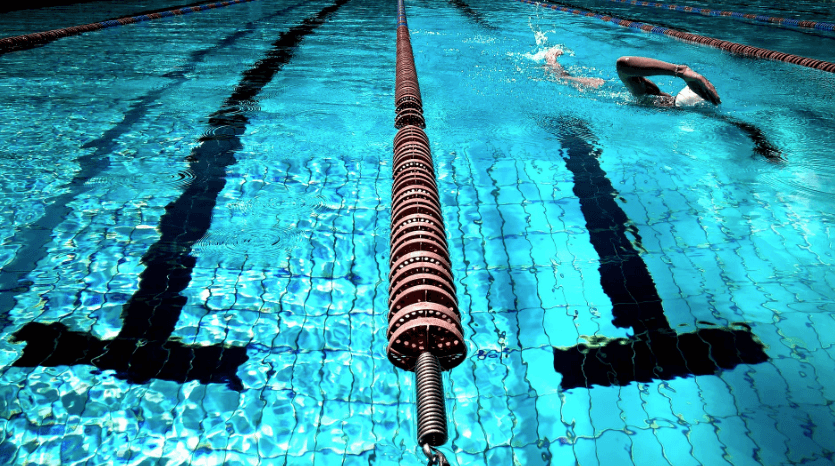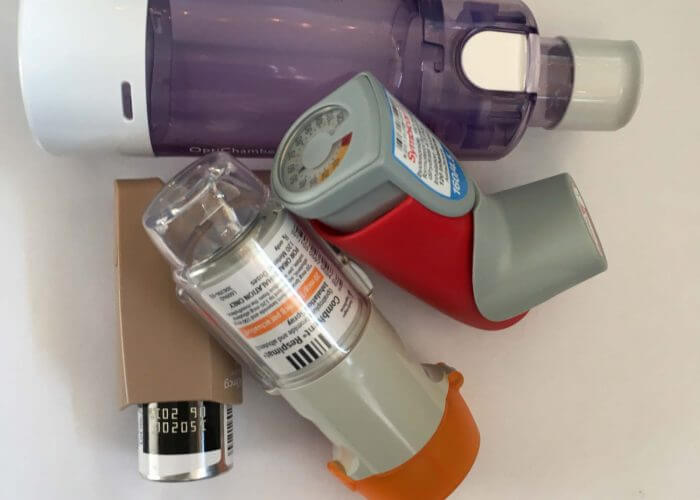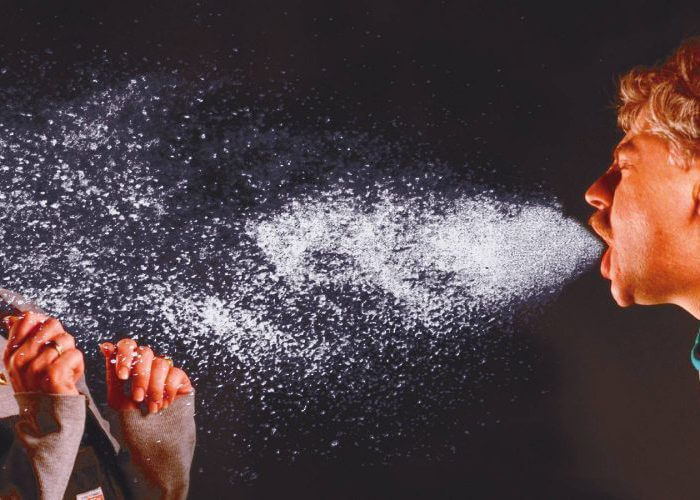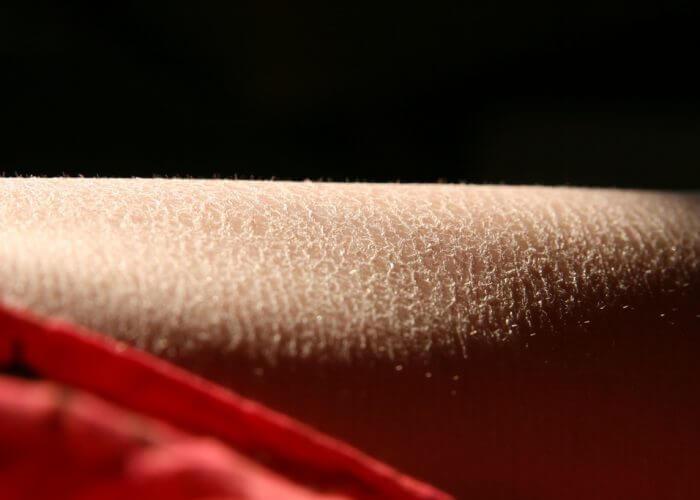The Silent Assassin: Is Chlorine Hurting Swimmers More than it is Helping?

The Silent Assassin: Is Chlorine Hurting Swimmers More than it is Helping?
By Olivia McKelvey
Distinctly recognizable with its pungent, bleach-like odor, chlorine is worn as a swimmer’s perfume whether they like it or not. Yet these chlorinated scents wafting off of swimmers’ bodies is not the only side effect these athletes deal with – the chemical has quite the reputation on the pool deck for other complications.
The Notorious “Chlorine Cough”

Photo Courtesy: Katie Wingert
Most swimmers have encountered the heinous “chlorine cough.” The deep burning sensation in the back of the throat in conjunction with oxygen deprivation is not only a colossal inconvenience but also a health hazard.
Experts warn that the cause of such wheezing and respiratory discomfort can stem from two issues. One: poor pool ventilation systems, and two: the mixture of chlorine with sweat, urine and even hair, which leads to the formation of chloramines.
One particular study published in the British Journal of Sports Medicine found that swimmers are at a higher risk for bronchial hyperactivity (also known as asthma) when they are exposed to chloramines. In fact, other statistics estimate that one-third of all elite swimmers have full-blown asthma, 80 percent of which began after they took up swimming. Many of you reading this right now can probably think of a handful of swimmers you know with asthma. Therefore, many of you also know that asthma is very treatable, allowing swimmers to participate with minor health repercussions as long as their inhalers are by their side.
If your team is confronted with the dreaded “chlorine cough,” consider shocking the pool or taking strides to be more proactive. Believe it or not, rinsing off with soap before entering the pool, or using the toilet rather than the place in which you train in as a urinal works wonders to prevent any further deterioration of swimmers lung tissues.
The Sneezer, the Wheezer, the Allergy Over-Achiever

Photo Courtesy: Wisequack
Some may refer to the swimmer in lane six as annoying or concerning after the sixteenth sneeze erupts from their chlorine irritated nostrils. Yet, it is not exactly a fun filled practice for them either. Although this classification of allergy-prone swimmers may seem rare, they’re not the needle in the haystack some might make them out to be. Indeed, roughly 50 to 65 percent of competitive swimmers are sensitized to common allergens in comparison to 29 to 36 percent of the general population based on findings from Ernest Blatchley, an environmental engineer who specializes in water chemistry. Another study performed by toxicologist Dr. Alfred Bernard confirms that chlorine and the byproducts it releases in the water hover above the air at the pool’s surface. This then causes changes in the airway and promotes the development of allergic sensitivities.
So, next time you or a fellow teammate finds themselves in the never ending loophole of sneeze attacks, have no fear: there are multiple options to relive the achoos. Option A: simply get out of the pool to get away from the chemicals; Option B: try a doctor recommended, over-the-counter allergy medication such as Zyrtec or Allegra. If all else fails, resort to a local allergen specialist to help ease your sufferings and save your teammates from your sneezing antics.
Skin as Dry as the Sahara

Photo Courtesy: Flickr
Flaky, scaly skin – these three words accurately depict yet another side effect of the swimmer lifestyle. Not enough Vaseline or soothing Jergen’s body lotion in the world can guarantee a swimmer to have happy, healthy and hydrated skin. The science behind this dilemma is that prolonged exposure to chlorine removes a protective layer created by sebaceous glands. When removed, your protective skin barrier can break down. Luckily, the skin will regenerate the protective sebaceous glands. Unluckily, flaking, itching, stinging, and burning may be a part of the process. At the end of the day though, dry skin may be the least of swimmers’ worries, as they are probably more concerned with anaerobic power sets, paces to hit, and goals to obtain.
“Swimmer Erosion:” An Absolute TOOTHdemic
Another faulty and undesirable side effect that has a strong correlation specifically within the sport of swimming is dental health damage. An unstable pH has been linked to causing the breakdown of tooth enamel, resulting in dark staining and yellowing of the teeth. Other symptoms associated with what dentists often refer to as “swimmer erosion” are sensitivity to extremely hot or cold food as well as rigidity and indentation on the surface of the tooth.
Even worse is that if erosion becomes extreme, teeth can chip and crack. The Center for Disease Control (CDC) reports that any pH reading between 7.2 and 7.8 is safe to swim in. Backed by more evidence from Dr. Leila Jahangiri’s study in 2010 is another prime example of enamel erosion victimizing swimmers. Jahangiri examined a swimmer over the course of five months for a 90 minute swim session every, concluding that a pH below seven caused signs and symptoms such as extremely sensitive teeth, dark staining and rapid enamel loss.
With swimmers constantly traveling from facility to facility – whether it be for meets across cities, states, or even country borders – constant exposure to pools increases the chances of them developing some sort of dental hygiene aggravation.
Chlorine alone is not the sole culprit of this toothdemic, however. The issue lies more within improper pool chlorination. In 2003, the CDC found that 54 percent of all swimming facilities tested were in violation of health codes including the following: faulty water disinfection practices, filtration system irregularity, and last but not least, improper chlorination. Hence, maybe it’s time we all start carrying around pH testing strips among our caps and goggles if that’s the price we must pay for healthy teeth.
The Reviews Are In
Granted that the above obstacles swimmers face due to an absurd amount of chlorine exposure does put them at risk for health conditions, the reality is that the sport has many other health benefits that some may argue outweigh the cons. The question at large still remains: is chlorine a precursor for more health dilemmas as the sport evolves and the biology of the swimmer evolves?
All commentaries are the opinion of the author and do not necessarily reflect the views of Swimming World Magazine nor its staff.




Speaking as a parent, coach, and former competitive swimmer who suffers from EoE (esophagus condition) and allergies/ asthma air quality is a MAJOR component of our sport that was ignored for decades.
Karl Fernandes
Dan DiSalle I believe it! Excellent summary. Poor ventilation is one of the major risks in developing asthma.
Karl Fernandes Spot on.
Chlorine is killing us parents and spectators for sure so I can’t imagine what it is doing to our swimmers
If you mix chlorine in with your food it will allow you to build up a resistance so the pool effects you less
During my daughter’s peak swimming years, she was on three different asthma medications… a steroid, a daily pill, and a rescue inhaler. It just became too much for her. Since she has “retired”, she has needed zero medications. Zero. I’ve often wondered if there are any similar issues with swimmers who regularly swim in salt water type pools? ?
Staci MK’s old swim instructor had to stop giving lessons cuz he was breaking out in a bad rash from the chlorine. We were sad cuz he was the best instructor
Salt water pools are no different in terms of chlorine related issues. Salt in the water is used to create chlorine and the same issues and by products result. If the pools are poorly designed and/or managed, swimmers will suffer!
I can’t agree more – my son is suffering from esophagus issues, asthma and teeth issues. There has to be a better way to manage the chlorine issue!!!
Shawn Cowper Daniels! Matt Bogle Karen Paulsen Bogle Phillip Williams Tera Johnson Williams
Saw this first hand – GRRRRRR!!!!!!?
Yep!!
Matthew Wagstaff read this and weep ???
This is why my daughter picked a college team that practices outside. She suffered for years with skin issues and breathing problems.
Dylan
Taking care of a pool and its pH is a constant process. Unfortunately most pool caretakers do not know this. It can get ugly.
Yes ?
lt is recommended swimmers to take strong dose of vitamin C( as an oxidizer) to neutralize or decrease the effects of chlorine. Consult your physician and/or primary Dr. for right doses of vitamin C to take.
Jim Tayebi my son also showers with VitC body wash after.
Where do you buy this?
Source?
Also, vitamin C is an ANTIoxidant.
Horacio Del Angel
Brandon Gillespie Devon Snedden
The weren’t these issues before they lowered the pool air quality standards and the number of times air had to be turned over.
Nelson Overhere Torres Eli Corniel
Claire Colfer Binder any of this sound familiar?
Jennel Wagner OMG! Let’s stop swimming. ?
Hahaha….that’s what I thought! What about the kids?
Jennel Wagner fortunately none of mine has developed asthma. I do wish there was a better ventilation system in most pools. ??
Sydney Tobias
Sarah Yukiko I mean…..
Mary Gus our entire swim team could’ve been diagnosed with chlorine cough
Sarah Yukiko oh easily
People always find humor in the “peeing in the pool” issue, but they don’t realize how serious of a health issue it is. KING club coaches out here in WA used to actually wear shirts that said “PEE IN THE POOL” and I found it (1) disgusting and (2) ignorant. Chemicals, and the chemicals created by urine combining with chlorine, are serious health hazards. But you’ll never stop it when coaches are ignorant or just plain reckless.
Burned eyes and no hair on arms and legs is yet another issue.
Me too
Jim Bowser all three of my children as swimmers/waterpolo players ?
My daughter and her teammmates have lost eyebrow hair before because of a practice pool that was over chlorinated.
Lori, a well meaning govt studies teacher pulled me aside after class in high school and confronted me about drug use when she saw my chlorine eyes. I told her it was only a symptom of pool water in some many words. I don’t think she believed me at first. I love that she cared so much about Me to try to help me if I needed help. I should have asked for a little visine. ?
Make sure you if you swim / your kids brush with Sensadyne Pro Enamel
What is the effect on teeth?
Is that backed up by any study/ies?
Jim Bowser it damages enamel and there have been studies.
Alla Lvov
Salt water pools.
Saltwater pools convert salt to chlorine
I did not grow body hair until months after I graduated from college. Also, I had problems with my teeth.
Just spent a weekend at a meet with horrible air quality. Won’t be going back unless the issues are taken care of
Kelly Stubbins worth a read
It is not the chlorine that is the problem! It is poorly managed water and air quality that give chlorine a really bad rap. The by-products of chlorine use and mismanagement associated with its use, lack of continuous monitoring and poor understanding of pool chlorination chemistry are the true culprits. A well managed and properly designed pool (chemical and pH control) and proper air handling can be managed so there is no chlorine smell present in or out of the water.
Erin
I recently heard it is advisable to run fractionated coconut oil into the skin before swimming. Has anyone else done this?
Where you heard this was there also a source given?
André Costa Silva no. It was a friend. I thought it sounded like a good idea to have that absorb into the skin first so less chlorine would.
I was put in swimming BECAUSE I was asthmatic. It literally saved my life, and my asthma now 50+ years later is in remission, and has been for years. I’ll take the risks, thx. Swimmer for life!!
Morgan Fleming Courtney MichelleAnna Rose MooreAnna Kassis the answer is yes
Yes, we experienced this issue too.
Since my son quit competitive swimming 3 years ago, he hasn’t been sick once. Whilst swimming, he was permanently sick with chest and sinus infections. Makes one think.
It’s more than just breathing problems. There is this…
There is a lot of well-founded concern about chlorine. When chlorine is added to our water‚ it combines with other natural compounds to form Trihalomethanes (chlorination byproducts)‚ or THMs. These chlorine by-products trigger the production of free radicals in the body‚ causing cell damage‚ and are highly carcinogenic. Chlorine is also suspected to contribute to hardening of the arteries‚ the primary cause of heart disease.
“We are learning the hard way that all the time we thought we were preventing epidemics of one disease‚ we were creating another. Two decades after the start of chlorinating our drinking water the present epidemic of heart trouble and cancer began.”
– Dr. Joseph M. Price‚ Ph
A lot more people die from cancer and heart disease now because they are no longer dying from infectious diseases or childhood illnesses. Vaccines are a good thing, and so is clean water for drinking and swimming.
If your area chlorinates water, at the very least get a filter for your drinking water that gets out chlorine. Good ones (like the Berkey—no, I have no connection with them) will get our bacteria and other chemicals, even Roundup, too. We now live in a rural area and have a well. No chlorine, but the water had E Coli before we moved in, so we had a water treatment system installed which kills bacteria with UV light somehow. Someone would get very rich if they could find an effective way to kill pool germs without killing people. (Too bad, because swimming is one of the best exercises.)
Leys Pools and Leisure Centre would tag the other pools in Oxford too. May want to keep an eye on air handling units! It’s stuffy at the moment. Probably needs some fresh air pumping in!
Hey my dear friend.
Glad news,we have passed Swim wear factory audit.
Most of customer are under developing new style for new season.
If you have new collection need to developing? PLS send us details for ref.
Here attached some style for ref, then you can see what we can do.:)
Hope to work with you soon.
Best regards!
Thanks & Regards,
Jose Eduardo
Not to mention…
Chlorine and Breast Cancer
Breast cancer, which now affects one in every eight women in North America, has recently been linked to the accumulation of chlorine compounds in the breast tissue. A study carried out in Hartford Connecticut, the first of its kind in North America, found that; “women with breast cancer have 50% to 60% higher levels of organochlorines (chlorination byproducts) in their breast tissue than women without breast cancer.”
Alex Maher have a read & comments
What is the solution?
Alex Maher have a read & comments
My girl is not swimming due to injuries from car accident and her skin is smoother and no breakouts. Yikes?
Since moving to Florida and swimming outdoors Liam is no longer on a daily inhaler. Cough much better still there occasionally but not like it was when we were inside.
absolutely…
Rae Rae
YES!!!!!!!!!!!!!!!!!!!!!!!!!
I have recommending PROBIOTICS to all my swimmers for years, as chlorine is TOXIC and we all infuse it into the gut…..
Right